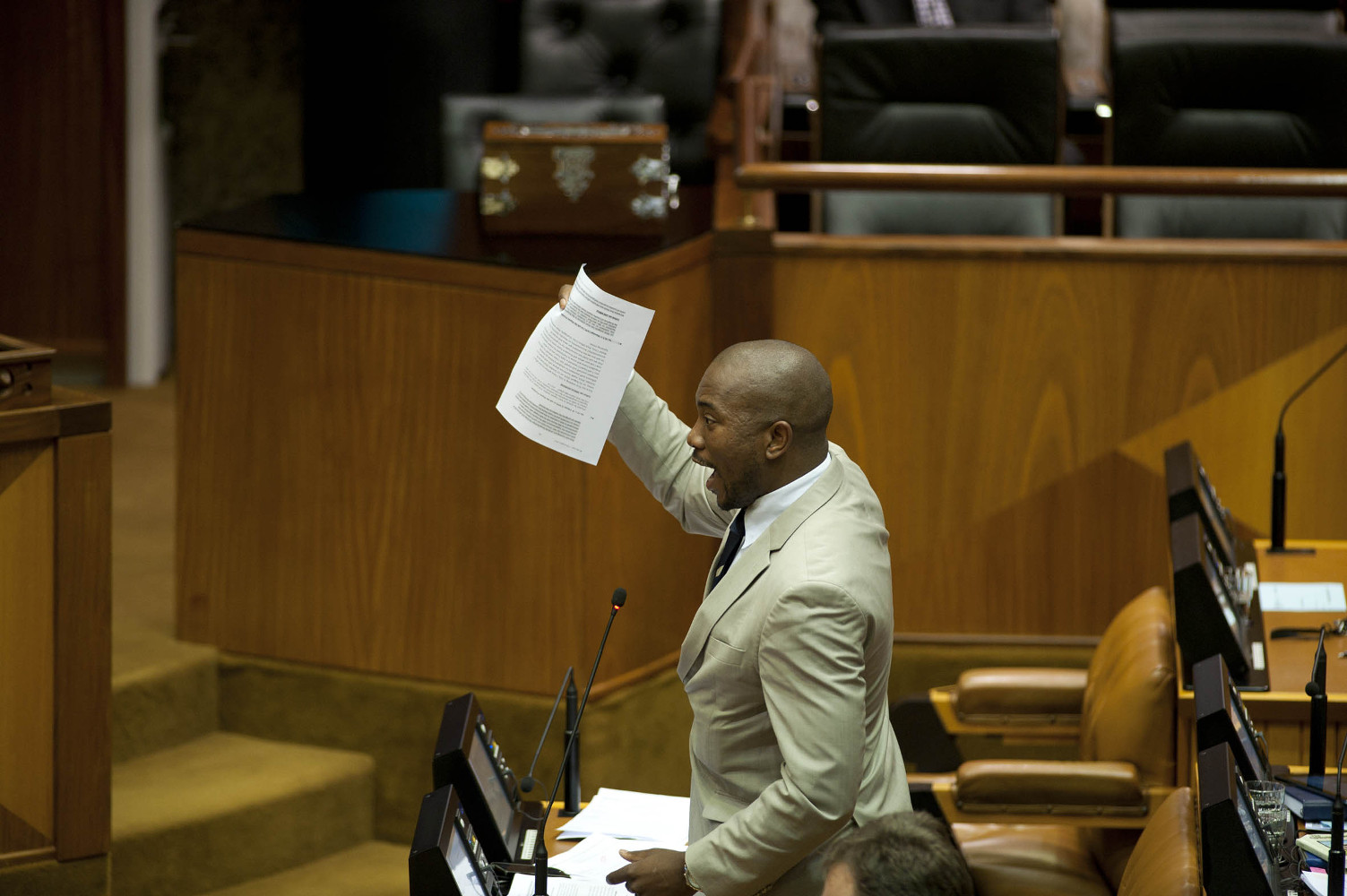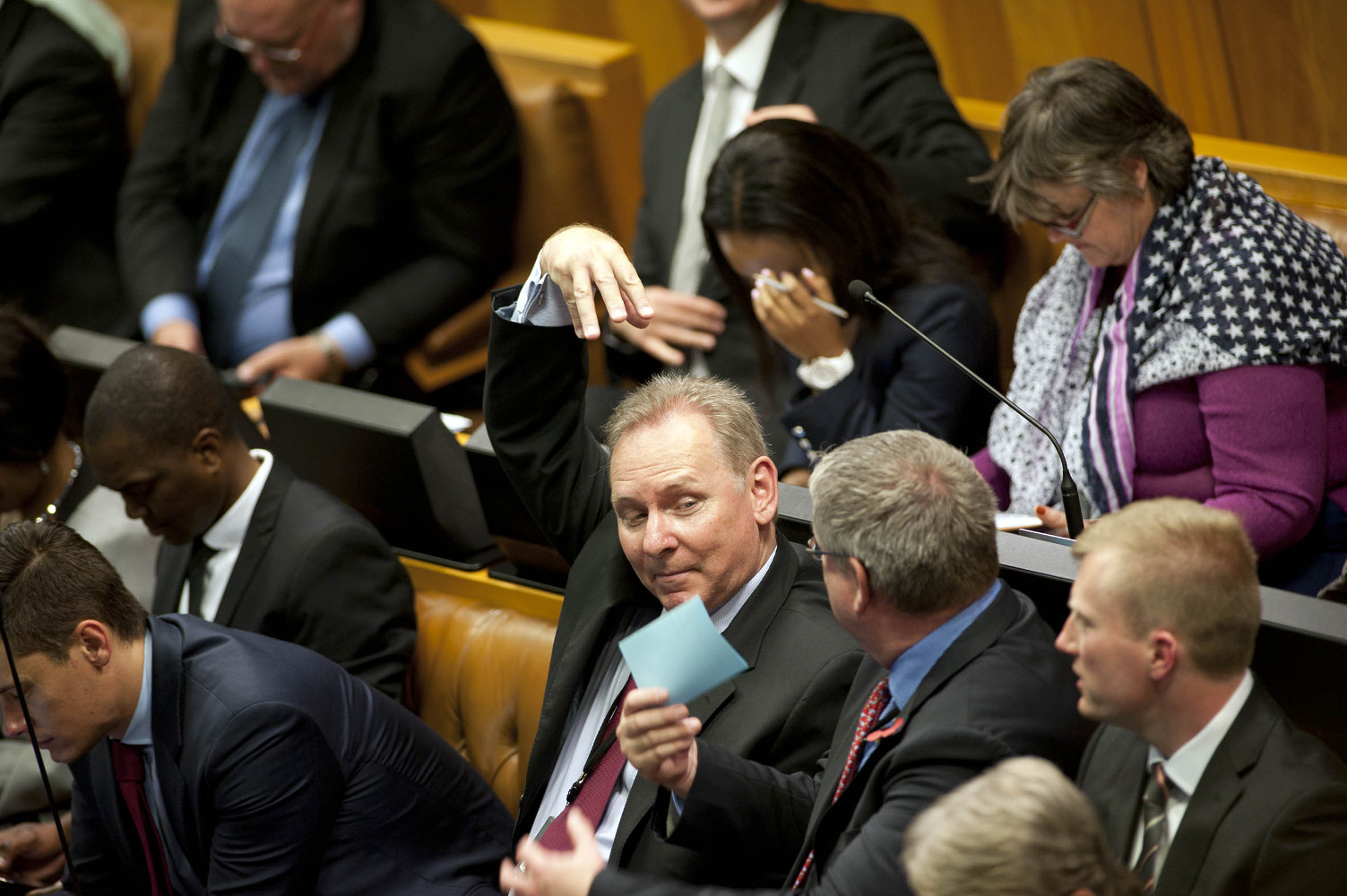Deputy President Cyril Ramaphosa addressed the National Assembly and urged opposition MPs to respect the president and his office.
Angry Deputy President Cyril Ramaphosa called on the leaders of political parties to show respect to President Jacob Zuma and his office.
Ramaphosa blamed the opposition parties for chasing Zuma out of Parliament, saying that as long as they disrespected Zuma there would be no good relationship between the executive and Parliament. He said there needed to be an environment conducive to a flourishing relationship between Parliament and the executive.
Ramaphosa was answering questions in the National Assembly on Wednesday when the atmosphere became heated following a question from the United Democratic Movement’s Mncedisi Filtane.
Filtane had asked Ramaphosa if he intended to have regular sessions with leaders of the opposition parties to streamline political management of the government’s legislative programme in the National Assembly and, if not, why not.
Filtane wanted to know when Ramaphosa would meet Parliament’s opposition leaders. He wanted Ramaphosa to discuss issues that included “a more rational allocation of speaking time in Parliament to opposition parties, as it is very difficult to develop a rational debate inside three minutes”.
Constitutional obligation
Ramaphosa, as leader of government business, is constitutionally obligated to engage regularly with the leaders of opposition parties, but has yet to meet with them. His responsibilities include being in charge of the affairs of the national executive in Parliament, the programming of parliamentary business initiated by the national executive and ensuring that Cabinet members attend to their parliamentary responsibilities.
Ramaphosa said he was planning to meet with the leaders of all parties represented in Parliament on November 18. He said his tight schedule had caused appointments with these leaders to be rescheduled and sometimes postponed.
Ramaphosa said he would engage the various leaders on issues of common interest and national importance, and would be prepared to discuss “anything under the sun”. The intention to meet the leaders of various organisations is there, he said.
DA parliamentary leader Mmusi Maimane noted Ramaphosa’s commitment to meet opposition leaders, but wanted to know when Zuma would appear in the National Assembly.

DA’s Mmusi Maimane demanded to know when President Jacob Zuma would appear before the National Assembly. (David Harrison, M&G)
Zuma has not appeared to answer questions in the National Assembly since August 21, when EFF MPs shouted him down, chanting “pay back the money”.
Otherwise engaged
He will be addressing the other House of Parliament, the National Council of Provinces, on Thursday afternoon.
“We can agree as leader of government business that it is fine for the president if he wants to go to the National Council of Provinces, but he must come here for accountability, this is where he is accountable,” said Maimane.
“Is he going to be accountable for Nkandla, for the electricity crisis, for the levels of unemployment that are rising, for Guptagate, for the crime, Rosatom … Deputy President, as leader of government business, are you going to make sure that the president complies with the rules of this House that he must be here four times a year?
“When will President Zuma appear before the National Assembly?” asked Maimane.
Ramaphosa sought to defend Zuma, saying that when he appeared before the House on August 21, he answered three of the six questions put to him and was not able to finish answering the questions largely because of an incident that occurred, which is under review and being handled by a powers and privileges committee.
Waiting for calm
He also read out a press statement issued by the presidency last month in response to media reports that Zuma will not be appearing in Parliament until it is no longer chaotic. The presidency said Zuma continues to meet his parliamentary obligations and that he responds to questions in the National Assembly.
“When he appeared here, members of this very House prevented the president from answering all the questions that he wanted to answer, so what more do you want?
“It is these very members who actually stood in the way of the president answering questions.”
Economic Freedom Fighters (EFF) MP Mbuyiseni Ndlozi and Maimane queried how Ramaphosa could be allowed to deflect the question and blame another process for Zuma not coming to Parliament.
“When is the president going to appear, it is as simple as that,” said Maimane in a raised voice and speaking over National Assembly Speaker Baleka Mbete, who was calling him repeatedly to order.
“This just proves the point. Ask the deputy president to answer the question. Let him answer the question,” added Maimane.
Incorrect rulings
The EFF’s Floyd Shivambu, who has clashed previously with Mbete and Ramaphosa, entered the fray, accusing Mbete of making incorrect rulings. But Mbete wouldn’t have any of it, as she refused to allow them to speak.
Sibongile Nkomo from the Inkatha Freedom Party asked Ramaphosa for his view on the relationship between the executive and Parliament, asking how it could be improved.
Ramaphosa said the relationship was enshrined in the Constitution and that it should be based on rules and respect for one another.
“What I do know is that the president respects this House. He has deep respect for this House,” he said to jeers from the opposition.
Ramaphosa said Zuma and the executive wanted to see a functional relationship between Parliament and the executive and that, at the moment, the relationship was not functioning well.

MPs at the National Assembly. (David Harrison, M&G)
“It becomes very difficult when there is howling, screaming and shouting to have a reasonable relationship. Now if you want to promote a good relationship, you have to create a climate, a conducive environment for that relationship to strive.
“For as long as the type of behaviour that one is getting from members of the parties in opposition persists, we will not have a good relationship between Parliament and the executive.
“I want to call upon members of the opposition parties to be respectful to the president of the republic, to be respectful to the office of the president of the republic,” said Ramaphosa.
Rules are rules
At this point, DA MP Ian Ollis, rising on a point of order, said opposition MPs did not need to do anything, as the rules are laid out in the Constitution.
“If the opposition does not need to do anything, then stop complaining. That’s exactly what you should do because it is a two-way street. If you want a good relationship between the executive and this House, then it must be mutually beneficial and it must be executed on both sides,” said Ramaphosa in response.
He said Zuma was keen to meet with members of opposition parties, adding: “Obviously when he meets, he will not be insulting them, he will not be screaming and shouting at them, he will be showing total respect to them because he remembers that as much as they are a minority in Parliament, they are leaders of our people. They are here because they were elected by our people to be here.”
That is the approach of the president, said Ramaphosa.
He ended by saying: “If leaders of political parties are going to be insulting, if they are going to be disrespectful and they are not going to recognise the position that he and other leaders hold, then it makes it very difficult for that type of meeting to take place.”
He was jeered throughout his responses.
Congress of the People’s Mosiuoa Lekota had a final word, when he said it couldn’t be right that MPs can expect to be addressed by the president or his deputy on condition that they behave in some way that the two dictate to them.